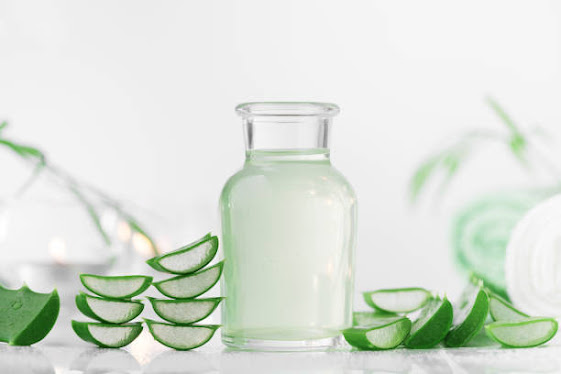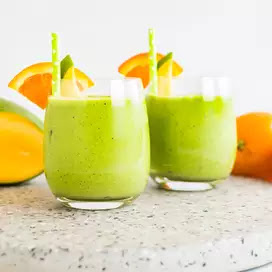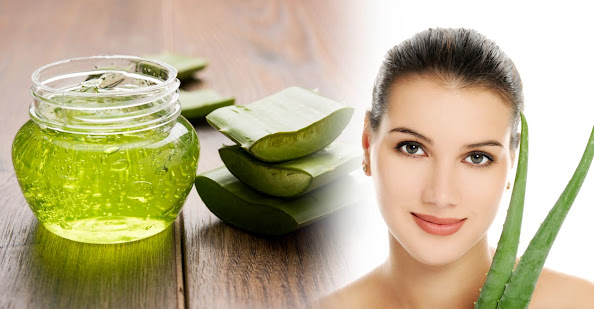Health Benefits And
Recipes Of Aloe Vera
 |
| Aloe vera is a succulent plant species that is native to North Africa and the Arabian Peninsula |
Overview
Aloe vera is a plant with miraculous medicinal properties good for health. It is a succulent plant species that is native to North Africa and the Arabian Peninsula, but it is now widely cultivated all over the world for its various medicinal and cosmetic uses.
Compounds And Ingredients Contained In Aloe Vera
Aloe vera contains a variety of compounds and ingredients that are believed to be responsible for its medicinal and cosmetic properties. These include:
Polysaccharides:
Aloe vera gel contains complex polysaccharides, such as acemannan, which are believed to have immunomodulatory and anti-inflammatory properties.
Anthraquinones:
Aloe vera contains anthraquinones, such as aloin and emodin, which are believed to have laxative and antibacterial properties.
Enzymes:
Aloe vera contains various enzymes, such as amylase and lipase, which can aid in digestion and break down fats.
Vitamins and minerals:
Aloe vera contains a range of vitamins and minerals, including vitamins A, C, and E, as well as calcium, magnesium, and zinc.
Salicylic acid:
Aloe vera contains salicylic acid, which is a natural exfoliant and can help unclog pores and reduce acne.
Amino acids:
Aloe vera contains 18 of the 20 essential amino acids, which are the building blocks of proteins and are important for maintaining healthy skin, hair, and nails.
Plant sterols:
Aloe vera contains plant sterols, such as campesterol and lupeol, which have anti-inflammatory properties and may help reduce cholesterol levels.
These are just a few of the many compounds and ingredients contained in aloe vera, and scientists are still exploring the many potential benefits of this versatile plant.
Medicinal Uses Of Aloe Vera And Methods Of Using It
Aloe vera has been used for centuries for its medicinal properties. Some of its most common uses and methods of using it include:
Treating burns and wounds:
Aloe vera gel can be applied topically to soothe and heal minor burns and wounds.
Simply cut a leaf from the plant, slice it open, and apply the gel to the affected area. The gel can also be used to treat sunburns and other skin irritations.
Moisturizing skin:
Aloe vera gel is an effective natural moisturizer that can help hydrate and nourish the skin and is good for skin allergies.
It can be applied directly to the skin or added to homemade skincare products, such as face masks or moisturizers.
Relieving digestive issues:
Aloe vera juice can be consumed orally to help relieve digestive issues, such as constipation and irritable bowel syndrome.
However, it is important to use caution when consuming aloe vera juice, as it can have laxative effects and may interact with certain medications.
Boosting immunity:
Aloe vera contains polysaccharides, which are believed to have immune-boosting properties.
Consuming aloe vera juice or taking aloe vera supplements may help support the immune system.
Managing diabetes:
Some studies have suggested that aloe vera may help manage blood sugar levels in people with diabetes. However, more research is needed to confirm this.
Reducing inflammation:
Aloe vera contains compounds that have anti-inflammatory properties, which can help reduce inflammation in the body.
This may be helpful in managing conditions such as arthritis or inflammatory bowel disease.
Treating acne:
Aloe vera gel can help reduce inflammation and redness associated with acne, and its antibacterial properties may also help kill acne-causing bacteria.
It can be applied directly to the skin as a spot treatment or added to homemade facial cleansers and toners.
Improving oral health:
Aloe vera can be used as a natural mouthwash to help improve oral health.
Its antibacterial properties may help kill harmful bacteria in the mouth, and it may also help reduce inflammation and promote the healing of gum tissue.
Supporting heart health:
Some studies have suggested that aloe vera may help support heart health by reducing cholesterol levels and improving blood flow.
However, more research is needed to confirm these potential benefits.
Relieving pain:
Aloe vera gel can be used topically to help relieve pain and inflammation associated with conditions such as arthritis or sore muscles.
It can also be added to baths to help soothe and relax the body.
Treating dandruff:
Aloe vera gel can help soothe an itchy, flaky scalp and may also help reduce dandruff.
It can be applied directly to the scalp or added to homemade hair care products, such as shampoos and conditioners.
Healing minor eye infections:
Aloe vera gel can be used as a natural remedy to soothe minor eye infections, such as pink eye.
A small amount of the gel can be applied to the eyelid and around the eye to help reduce inflammation and promote healing.
Soothing skin conditions:
Aloe vera gel can be used to soothe a variety of skin conditions, including eczema, psoriasis, and rosacea.
Its anti-inflammatory and moisturizing properties may help reduce inflammation and dryness associated with these conditions.
Improving wound healing:
Aloe vera has been shown to help improve wounds healing by increasing blood flow to the affected area and promoting the growth of new skin cells.
It can be applied topically to minor cuts and wounds to help speed up the healing process.
Fighting cancer:
Some studies have suggested that aloe vera may have anticancer properties and may be useful in the treatment and prevention of certain types of cancer.
However, more research is needed to confirm these potential benefits.
Overall, aloe vera is a versatile plant that has many potential medicinal uses.
However, it is important to use it safely and under the guidance of a healthcare professional, as it can interact with certain medications and may cause adverse reactions in some people.
Recipes Using Aloe Vera
Aloe vera can be consumed for its health benefits in a variety of ways, including:
1. Aloe vera juice:
 |
| Aloe vera juice can help improve digestion, boost the immune system, and promote healthy skin |
Here is a simple recipe for preparing aloe vera juice at home:
Ingredients:
1 large aloe vera leaf
2 cups water
1-2 tablespoons honey (optional)
1/2 lemon (optional)
Instructions:
Wash the aloe vera leaf thoroughly and remove the spikes along the sides using a knife.
Cut off the top and bottom of the leaf and slice it in half lengthwise.
Use a spoon to scoop out the clear gel from the inside of the leaf and transfer it to a blender.
Add 2 cups of water to the blender and blend on high speed until the mixture is smooth.
Pour the mixture through a fine mesh strainer to remove any leftover pulp.
If desired, add 1-2 tablespoons of honey to sweeten the juice or squeeze half a lemon to add a tangy flavor.
Mix well and store the juice in a refrigerator for up to a week.
Be sure to consult with your healthcare provider before consuming aloe vera juice if you have any underlying health conditions or are taking medications.
2. Aloe vera smoothie:
 |
| Recipe for a simple and refreshing aloe vera smoothie |
Here is a recipe for a simple and refreshing aloe vera smoothie:
Ingredients:
1 large aloe vera leaf
1 cup coconut water
1 banana
1/2 cup frozen pineapple
1/2 cup frozen mango
1 tablespoon honey (optional)
Instructions:
Wash the aloe vera leaf thoroughly and remove the spikes along the sides using a knife.
Cut off the top and bottom of the leaf and slice it in half lengthwise.
Use a spoon to scoop out the clear gel from the inside of the leaf and transfer it to a blender.
Add the coconut water, banana, frozen pineapple, and frozen mango to the blender.
If desired, add a tablespoon of honey to sweeten the smoothie.
Blend on high speed until the mixture is smooth and creamy.
Pour the smoothie into a glass and serve immediately.
3. Aloe vera tea:
 |
| Recipe for preparing a soothing aloe vera tea |
Here is a recipe for preparing a soothing aloe vera tea:
Ingredients:
1 large aloe vera leaf
3 cups water
1 tablespoon honey (optional)
1/2 lemon (optional)
Instructions:
Wash the aloe vera leaf thoroughly and remove the spikes along the sides using a knife.
Cut off the top and bottom of the leaf and slice it in half lengthwise.
Use a spoon to scoop out the clear gel from the inside of the leaf and cut it into small pieces.
Bring 3 cups of water to a boil in a pot.
Add the aloe vera pieces to the pot and reduce the heat to low.
Let the mixture simmer for 15-20 minutes.
Strain the liquid into a cup using a fine mesh strainer.
If desired, add a tablespoon of honey and squeeze half a lemon to add flavor to the tea.
Stir well and enjoy your aloe vera tea!
Our Other Must-Read Articles:
4. Aloe vera in food:
Aloe vera gel can be added to food, such as salads or stir-fries, for a nutrient boost.
It is important to note that aloe vera should be consumed in moderation and that not all parts of the plant are edible.
5. Aloe vera water:
Here is a recipe for preparing refreshing aloe vera water
Ingredients:
1 large aloe vera leaf
4 cups water
1/2 lemon (optional)
1 tablespoon honey (optional)
Instructions:
Wash the aloe vera leaf thoroughly and remove the spikes along the sides using a knife.
Cut off the top and bottom of the leaf and slice it in half lengthwise.
Use a spoon to scoop out the clear gel from the inside of the leaf and cut it into small pieces.
Add the aloe vera pieces and 4 cups of water to a pitcher.
If desired, squeeze half a lemon into the water to add a tangy flavor.
If desired, add a tablespoon of honey to sweeten the water.
Stir well to combine all the ingredients.
Chill the aloe vera water in the refrigerator for at least an hour before serving.
Pour the water into glasses and enjoy your refreshing aloe vera water!
6. Aloe vera salad dressing:
Aloe vera gel can be mixed with olive oil, vinegar, herbs, and spices to create a healthy and flavorful salad dressing. This is a great way to add some extra nutrients and health benefits to your meals.
7. Aloe vera face mask:
Aloe vera gel can also be used topically on the skin as a face mask.
Simply apply the gel to the face and leave it on for 10-15 minutes before rinsing off with warm water.
This can help soothe and hydrate the skin, reduce inflammation, and promote the healing of acne and other skin conditions.
8. Aloe vera hair mask:
Aloe vera gel can be used as a hair mask to promote healthy hair growth and improve the overall health of the scalp.
Simply apply the gel to the scalp and hair, leave it on for 30 minutes to an hour, and then rinse off with warm water.
This can help reduce dandruff, soothe an itchy scalp, and promote shiny, healthy hair.
How to prepare and preserve Aloe Vera Gel at home?
 |
| Preparing and preserving aloe vera gel at home is relatively easy |
Preparing and preserving aloe vera gel at home is relatively easy and can be done with the following steps:
Select a mature aloe vera leaf that is healthy and free of any blemishes or discoloration.
Cut the leaf close to the base of the plant using a sharp knife.
Rinse the leaf under running water to remove any dirt or debris.
Lay the leaf flat on a cutting board and use a sharp knife to carefully slice off the spiky edges on either side of the leaf.
Slice the leaf lengthwise down the middle to expose the clear, gel-like substance inside.
Use a spoon to scrape out the gel and transfer it to a clean bowl.
Rinse the gel under running water to remove any remaining latex, which can cause irritation.
Blend the gel in a blender or food processor until it becomes smooth.
Transfer the gel to a clean glass jar with a tight-fitting lid.
Store the jar in the refrigerator for up to two weeks.
To preserve aloe vera gel for a longer period of time, you can also freeze it in an ice cube tray and then transfer the cubes to a freezer-safe bag.
The gel can be stored in the freezer for up to six months. When ready to use, simply thaw a cube at room temperature or in the refrigerator.
It is important to use caution when handling aloe vera leaves, as the sap can cause skin irritation and should not be consumed.
Always wash your hands and any equipment thoroughly before and after handling the plant.
Frequently Asked Questions About Aloe Vera:
Here are some frequently asked questions about aloe vera along with their answers:
Q: Is aloe vera safe to use?
A: Aloe vera is generally safe to use when taken orally or applied topically to the skin.
However, some people may be allergic to the plant or may experience side effects such as diarrhea, stomach cramps, or skin irritation.
Q: How do I use aloe vera on my skin?
A: Aloe vera gel can be applied directly to the skin as a moisturizer or to soothe sunburn, rashes, or other skin irritations.
It can also be used as an ingredient in homemade skin care products such as face masks or lotions.
Q: What are the benefits of aloe vera juice?
A: Aloe vera juice can help improve digestion, boost the immune system, and promote healthy skin. It is also a good source of vitamins, minerals, and antioxidants.
Q: Can aloe vera help with sunburn?
A: Yes, aloe vera is a popular remedy for sunburn due to its soothing and cooling properties.
Applying aloe vera gel directly to sunburned skin can help reduce inflammation, relieve pain, and promote healing.
Q: Is aloe vera effective for weight loss?
A: While aloe vera is not a weight loss miracle cure, some studies suggest that it may help promote weight loss when combined with a healthy diet and exercise.
Aloe vera contains compounds that can improve digestion, increase metabolism, and reduce inflammation.
Q: Is aloe vera safe for pets?
A: While aloe vera can be safe for pets when used in small amounts, it is important to avoid giving your pet aloe vera products that contain other ingredients that may be toxic to animals.
Always consult with a veterinarian before using any new products on your pet.
Q: Can aloe vera help with diabetes?
A: Some studies suggest that aloe vera may have benefits for people with diabetes such as lowering blood sugar levels and improving insulin sensitivity.
However, more research is needed to fully understand the effects of aloe vera on diabetes.
Q: Is aloe vera safe during pregnancy?
A: While aloe vera is generally considered safe for most people, pregnant women should exercise caution when using aloe vera products.
There is limited research on the safety of aloe vera during pregnancy, and some sources suggest that it may have a laxative effect that could be harmful to the developing fetus.
It is always best to consult with a healthcare provider before using any new products during pregnancy.
Q: Can aloe vera be used as a natural remedy for constipation?
A: Aloe vera has laxative properties that can help relieve constipation when used in moderation.
However, it is important to use caution when using aloe vera as a laxative, as high doses can cause diarrhea and other digestive problems.
Q: Can aloe vera help with arthritis pain?
A: Aloe vera has anti-inflammatory properties that may help reduce pain and inflammation associated with arthritis.
Some studies suggest that taking aloe vera supplements or using aloe vera topically may provide relief for people with osteoarthritis or rheumatoid arthritis.
Q: Can aloe vera help with cold sores?
A: Aloe vera has antiviral properties that may help reduce the duration and severity of cold sores.
Applying aloe vera gel directly to the affected area can help soothe the skin and promote healing.

Comments
Post a Comment